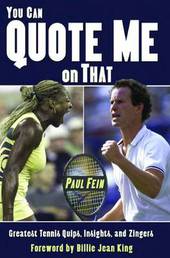
|
You Can Quote Me on That: Greatest Tennis Quips, Insights, and Zingers
Paperback
Main Details
| Title |
You Can Quote Me on That: Greatest Tennis Quips, Insights, and Zingers
|
| Authors and Contributors |
By (author) Paul Fein
|
| Physical Properties |
| Format:Paperback | | Pages:288 | | Dimensions(mm): Height 230,Width 150 |
|
| Category/Genre | Tennis |
|---|
| ISBN/Barcode |
9781574889253
|
| Classifications | Dewey:796.342 |
|---|
| Audience | |
|---|
|
Publishing Details |
| Publisher |
Potomac Books Inc
|
| Imprint |
Potomac Books Inc
|
| Publication Date |
31 January 2005 |
| Publication Country |
United States
|
Description
You Can Quote Me on That isn't about the polite, country-club sport where players shake hands over the net and offer congratulations on a fine drop shot. It views tennis from inside, where competition is grueling, tempers flare, and egos collide. Top tennis journalist Paul Fein has compiled hundreds of the most outrageous, most significant, and most illuminating quotes on, by, and about tennis's biggest stars and hottest controversies. You want smack talk? How about Maria Sharapova brushing aside an intended compliment with "I'm not the next Kournikova - I want to win matches!" Wonder why Jimmy Connors was such a cutthroat? According to his mother, "Jimmy was taught to be a tiger on the court. When he was young, if I had a shot I could hit down his throat, I did. And I'd say, 'See, Jimmy, even your mother will do that to you.' " Fein even delves into the gritty detail of players' personal lives. Witness Andre Agassi's explanation that "sex doesn't interfere with your tennis; it's staying out all night trying to find it that affects your tennis." And of course legendary bad boy John McEnroe both fires off and gets hits with multiple zingers. Fein includes quotes of praise, thoughtful commentary, and interesting points about players, tournaments, and the game - where it's been and where it's headed. If it's about tennis and worth remembering, well, You Can Quote Me on That. You Can Quote Me on That brought back a flood of wonderful memories, and I discovered plenty of juicy quotes I never heard before. Ever since I first picked up a tennis racket as an eleven-year-old in Long Beach, California, I've crusaded to improve the sport I love. I battled country club elitism and snobbery, the reactionary establishment, "shamateurism," racism, homophobia and sexism. Winning thirty-nine Grand Slam titles, including twenty at Wimbledon, and thumping Bobby Riggs in the famous "Battle of the Sexes" match gave me the public platform I needed. Early on, I learned the power of words. They can make people laugh and cry, think and argue, and ultimately inspire us to do good and great things. Tennis history has always been a huge fascination for me. I loved stories about the tradition-breaking flamboyance of Suzanne Lenglen, the classic elegance of Helen Wills, and the serve-and-volley boldness of Alice Marble. As an enthusiastic teenager, I not only dreamed of playing like these champions, I wanted to be like them. Lenglen liberated tennis women in the 1920s with her attitude as much as her then-risque attire. "I just throw dignity to the wind and think of nothing but the game," she proclaimed. Those words stuck in my mind, as did the eloquence of Helen Wills Moody, the first American to dominate women's tennis. Seventy years ago she said: "Concerning the limits and limitations of the women's game - why should we believe there are any?" My thoughts exactly! That passion for tennis is reflected every day around the world, whether it be at a gritty public court in Compton, California, where Venus and Serena got started, or Centre Court at Wimbledon - my favorite place in the world. Tennis players tell it like it is. They praise and lambaste opponents, confide their hopes and fears, talk tennis issues, and express themselves in every conceivable way. Andre Agassi is one of my favorite players because he's a champion off the court, too. He's raised millions of dollars for charities, and his college preparatory academy in Las Vegas has given hope to hundreds of disadvantaged children. After Andre rebounded from a devastating career slump to win Roland Garros in 1999, he said, "I've got to say, what turns me on more than anything is just making a difference in people's lives. That's one thing I've taken with me and I'll keep. Probably even more so than the accomplishments itself at the French Open is the fact that somewhere along the line it gave hope to people." Paul Fein, an award-winning journalist, is also a sectional tournament player, former satellite tournament director and regional TV commentator, and teaching pro, who knows first-hand about the pressures, joys and disappointments of competition. Paul's You Can Quote Me on That contains hundreds of funny, informative and provocative quotes by and about present and past stars on thirty-five different topics. No one and nothing is spared. I found the entire book engrossing. I'm sure you will, too. And you can quote me on that! - Tennis superstar Billie Jean King
Author Biography
Paul Fein has been a tennis writer for more than twenty-five years. Tennis Week's journalist of the year for 1991, he has won more than a dozen writing awards and is the author of Tennis Confidential (Brassey's, Inc., 2002). He's also served the sport as a television commentator, a teaching pro, a satellite tournament director, and a referee. He lives in Agawam, Massachusetts.
Reviews"Longtime tennis journalist Paul Fein has compiled about 1,700 of the sport's best quotes, ranging from poignant observations to outrageous blasts from tennis stars and celebrities alike. The collection leaves no doubt that today's talent knows how to serve up a sound bite."
|